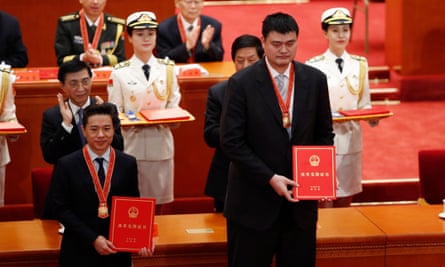The Chinese president, Xi Jinping, has attempted to shore up confidence in his leadership and the country’s slowing economy with a strongly worded speech warning other nations not to “dictate to” Beijing.
“No one is in a position to dictate to the Chinese people what should or should not be done,” Xi said in a speech marking the 40th anniversary of the opening up of the Chinese economy. “We must resolutely reform what should and can be changed, we must resolutely not reform what shouldn’t and can’t be changed.”
Xi’s speech comes at a turning point for China, following decades of economic growth that have transformed it into the world’s second largest economy. On 18 December 1978, the then leader, Deng Xiaoping, opened a meeting that officially initiated China’s transition from a command economy, dominated by old-style Maoist communism, to a market economy, or “socialism with Chinese characteristics”.
Now, the Chinese leadership is vying with slowing growth, a trade confrontation with the US, and international criticism over human rights violations. Observers hoped Xi would lay out new directions or reforms needed to help the Chinese economy, weighed down by debt and lagging consumption, and an overly dominant state sector.
Instead, his remarks focused on the supremacy of the ruling Chinese Communist party. Hailing the party’s leadership and strategy up to now as “absolutely correct”, he listed the government’s accomplishments.

“Grain coupons, cloth coupons, meat coupons, fish coupons, oil coupons, tofu coupons, food ticket books, product coups and other documents people once could not be without have now been consigned to the museum of history,” he said.
“The torments of hunger, lack of food and clothing, and the hardships which have plagued our people for thousands of years have generally gone and won’t come back.”
While promising to continue reforms, Xi did not detail any specific policies, failing to inspire confidence in Asian markets. Hong Kong and Shanghai both dropped sharply during the speech. They are now off 1% for the day while losses have deepened to 1.8% in Tokyo and more than 1% in Sydney.
“President Xi was perhaps unsurprisingly long on rhetoric and short on details,” said Tom Rafferty, regional manager for China at the Economist Intelligence Unit. “There will be a sense of disappointment, among both local and international investors, that Xi did not give clearer signals about the direction of future economic reform at a time when the Chinese government’s commitment to market liberalisation is seen to have waned.”

Critics say politics are getting in the way of needed reforms as China’s economic troubles pose a rare challenge to Xi, who has amassed power more quickly than any of his predecessors. Experts say Xi’s first term has been focused on political goals, such as an anti-corruption drive and a crackdown on dissent.
He has been criticised for increasing the state sector’s control over the economy, as private companies have had more difficulty accessing credit. Economic growth underpinned by debt-funded infrastructure projects has also slowed.
Xiang Songzuo, an economist at Renmin University in Beijing, said at a forum at the weekend that problems for private businesses in China go beyond access to financing. “What is the fundamental problem? Fear of policy uncertainty, fear that the government is not trustworthy,” he said.

Under Xi, the party has promised a “new era” for China’s opening up. Yet observers say his speech did not indicate any decisive new direction for the country.
“Despite all of the intense international pressure and domestic concerns about economy, Xi’s speech focused on making a case for the strength of China’s current path,” said Julian Gewirtz, a fellow at Harvard University’s Weatherhead Center for International Affairs.
“But will this rhetoric succeed in generating confidence? Those who were hoping that Xi would personally make substantive new pledges today will be disappointed.”
Other critics say Xi’s assertive industrial and foreign policies have provoked confrontation with the US unnecessarily and overturned a decades-long policy, started by Deng, of keeping a low profile on the international stage.
Xi’s signature foreign policy has been the Belt and Road project, a massive investment drive to connect Asia, Europe, the Middle East, and Africa by land and sea. At home, the government has pushed an industrial plan to upgrade Chinese manufacturing called Made in China 2025, which forms a key part of US complaints about Chinese intellectual property theft.
In his remarks, Xi reiterated earlier promises that China would “never seek global hegemony”.
“China is approaching the centre of the world stage and has become a recognised builder of world peace, a contributor to global development, and a defender of the international order,” he said.
Xi gave his hour-and-a-half-long speech from behind a desk in contrast to previous remarks given at the Great Hall, delivered from a lectern.
He made several references to “all ethnic groups” coming together behind the party, remarks that appear to be a response to international criticism response of China’s policies in the far western region of Xinjiang, where as many as one million Muslim minorities, many of them Uighurs, are being kept in detention camps.
Xi reiterated the party’s complete control over the country. “Whether it’s the party, the government, the army, ordinary people or students, the east, the west, the south, the north or the middle, the party leads everything,” he said.
